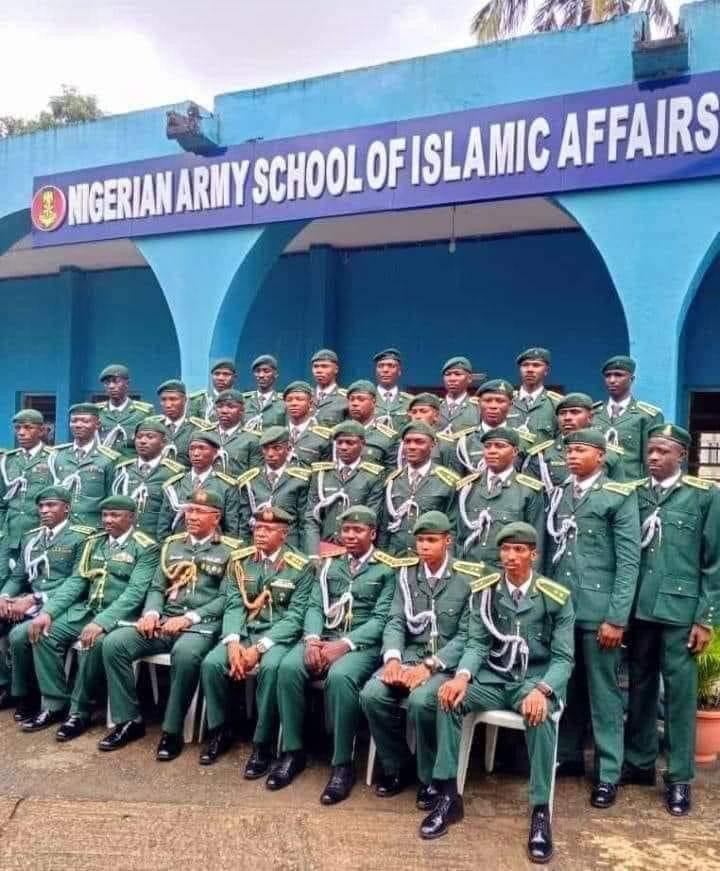National Issues
The School of Islamic Affairs by the Nigerian Army, by Tife Owolabi
The field of Development studies emerged after World War II to address global inequalities . Particularly to bridge the gap between the North’s rich and poor South, and so are many courses today.

The Nigerian state is controversial. The citizens live, eat and breathe conspiracy theories. Earlier during the week a picture of some Military graduands surfaced on social media with a backdrop of the Nigerian Army School of Islamic Affairs boldly written. This has generated mixed reactions across all spectrum of ethnicities and religions. At first, I ignored it because not everything worth one’s attention.
I don’t know how true the background sign particularly is in the era of deep AI but if it is true there is nothing wrong with unbundling school curricula to serve a purpose.
I am a political scientist majoring in Development studies. Under political science are various studies, international relations, development studies, public administration, Security and peace studies. This goes for Mass Communications today, we have public relations, advertising, prints, etc. It wasn’t so at the beginning.
The field of Development studies emerged after World War II to address global inequalities . Particularly to bridge the gap between the North’s rich and poor South, and so are many courses today.
Come to the subject at hand, the Nigerian Army School of Islamic Affairs. It is common knowledge that the Nigerian state is at war, particularly in the Northern parts fighting Terrorist groups and Bandits among other crime elements. The Boko Haram insurgency in Nigeria is a long-running conflict that began in July 2009. The group, formed in 2002 by Mohammed Yusuf, initially opposed Western education, but later evolved into a terrorist organization seeking to establish an Islamic state in Nigeria.
The conflict is part of a larger pattern of religious violence between Nigerian Muslims and Christians, with Boko Haram targeting both civilians and military personnel. The group’s first terrorist attack occurred in January 2010, marking the beginning of a violent campaign that has resulted in thousands of deaths and displacement.
The conflict escalated in 2014, with 10,849 deaths reported that year alone. In 2015, Boko Haram pledged allegiance to the Islamic State, becoming the “Islamic State’s West Africa Province” (ISWAP). However, the two groups split in 2016, with the dissidents continuing to operate as ISWAP.
The Nigerian military has struggled to contain the insurgency, with the conflict spreading to neighboring countries. The humanitarian impact has been severe, with millions displaced and facing food insecurity. The conflict has also had a significant impact on the region’s economy and social fabric.
Now those questioning or Alarmes by this gesture. Why won’t the Military embark on such a study if not the exigence of time? What is wrong if a department of studies is created to analyse this phenomenon?
My take, is the Nigerian Army’s creation of a School of Islamic Affairs to study the nuances of Islamic extremism and terrorism is a prudent move, considering the current security challenges facing the country. The military’s involvement in academic research may seem unconventional, but it’s essential to understand the context.The Nigerian Army is facing an unconventional enemy in Boko Haram, which uses ideology and religion to fuel its insurgency. To effectively counter this threat, the military needs to understand the ideological underpinnings of the group’s beliefs and tactics.
By establishing a dedicated department to study this phenomenon, the Nigerian Army can gain valuable insights into the motivations, tactics, and strategies of Boko Haram. This knowledge can inform military operations, enhance counter-terrorism strategies, and improve overall national security.
The exigency of time is indeed a factor, as the country faces ongoing security challenges. The military’s involvement in research can provide timely and actionable intelligence to support ongoing operations.
It’s not uncommon for militaries to engage in research and analysis to better understand emerging threats. In fact, many military institutions around the world have research centers and think tanks focused on strategic studies, terrorism analysis, and cultural studies.
So, the Nigerian Army’s initiative is a welcome development, and its findings could contribute significantly to the global understanding of terrorism and counter-terrorism strategies. As such those calling for schools of Christian and traditional Affairs can start their insurgencies too to enable the state or the Nigerian military to establish a department to cure the unneeded attention.
Tife Owolabi is a Development Studies Researcher and he writes from Yenagoa, Bayelsa.

























